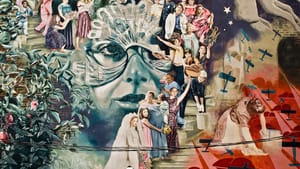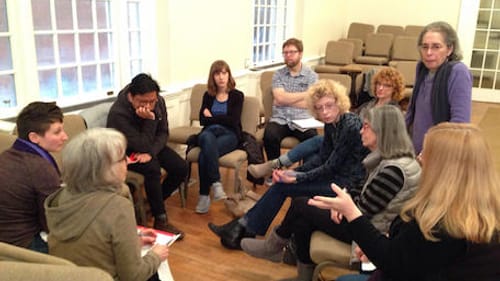Writers go live
Philadelphia Writers Resist tackles NEA/NEH funding cuts

At Philadelphia Writers Resist's second meeting, held at Rittenhouse Square’s Ethical Society, author and educator Annie Liontas spoke about a Philly-centric plan to combat cuts in National Endowment for the Arts (NEA) and National Endowment for the Humanities (NEH) spending. Liontas wants to launch a volunteer movement for “live petitions” to let Congress know their Pennsylvania constituents value support for the arts. But Liontas seemed to be the only writer in attendance who knew what that meant.
Remember when, instead of adding your name to a list on a website and then tweeting the link, you spoke directly to a person with a clipboard and signed an actual sheet of paper, which was then delivered to its target along with all the other signatures? That’s a live petition — or as we used to call them before the Internet, a petition. Liontas insisted that our current fad of viral online petitions just isn’t effective: Meetings, phone calls, and paper campaigns get legislators’ attention.
But the on-the-ground logistics of this effort are more complicated than clicking a link. That’s why a locally motivated crew like Writers Resist, getting together in the real world, matters.
Laying plans
Helmed by Ambler-based author Stephanie Feldman, the original Philadelphia #WritersResist: United for Liberty gathering drew hundreds to the National Museum of American Jewish History on January 15, 2017, as part of a National Day of Readings in advance of the presidential inauguration (here’s Wendy Rosenfield’s gallery of attendees and Darnelle Radford’s podcast interview with Feldman). The success of that event led to Writers Resist's first official planning meeting in February, which Feldman said drew about 100 people and lasted over two hours.
That agenda was about “what we could do as a group” to resist the new administration’s apparent disdain for the press, arts funding, and the human rights these support, and identifying what issues meant the most to the gathered writers.
This meeting was smaller, with about 30 people in attendance, but a simultaneous Philly Town Hall meeting with Senator Bob Casey may have dampened turnout.
Crawlspaces, Qwerty, PhillyCAM, and more

Hannah Miller spoke about building an “activist library” to compile organizational resources for those new to activism. Alicia Askenase shared a coming opportunity to volunteer for developing educational workshops she called “crawlspaces for liberty,” including a youth-targeted curriculum based on readings from the initial event. Local journalist and author Lori Tharps shared the inspiration behind her new Qwerty online platform, designed as a clearinghouse for a range of “literary” services and events — a coordinated resource she said the city so far lacks.
Qwerty will define “literary” quite broadly: It’ll include writers, publishers and bookstore owners looking for a unified platform to help plan, coordinate, and promote industry events and will host its own editorial content. It’s scheduled to launch April 3, 2017.
Susan Robbins, leader of the Rhythm and Verse Salon, spoke about why writers should connect to local theater companies to broaden their reach outside their traditional audience, as well as an upcoming salon featuring “resistance poetry” on the theme of “inclusion and exclusion.” She’s accepting one-page submissions, including poetry, essay excerpts, or dialogues, through March 24, 2017.
Charles Carr of Moonstone Arts Center shared his plans for a pair of upcoming episodes on his PhillyCAM show, Philly Loves Poetry (airing on the first Tuesday of every month): panel discussions on resistance through poetry. Andy Futuro announced Art Against Fascism, happening March 19, 2017, at South Street’s Tattooed Mom. The event will be packed with local independent artists and writers selling their work and donating proceeds to the ACLU of Pennsylvania (Tattooed Mom will donate 20 percent of the bar’s take that night, too).
Live petitions?
Liontas talked about her plan for fighting proposed cuts to the NEA and NEH. “Cuts at that level mean there will be cuts at every level,” she said. The NEA funds 20 core Philadelphia arts organizations, including the Arden, Wilma, and InterAct theaters, as well as the Network for New Music, Art-Reach, Philadelphia Folklore Project, Philadelphia Photo Arts Center, Mural Arts, and more.
Attendees wrestled with Liontas’s idea, which involves getting Writers Resist’s NEA/NEH petitions to these organizations so they can gather signatures on site. Writers Resist's Feldman explained, “This is a moment where a lot of organizing is happening." Writers Resist doesn’t want to reinvent the wheel, but Feldman does hope the group wants to explore “what we can do as writers that other groups are not working on.”
What, When, Where
Follow Writers Resist on Twitter @ResistPHL or at its blog for updates on actions and details for the next meeting, which will take place April 8, 2017.
Sign up for our newsletter
All of the week's new articles, all in one place. Sign up for the free weekly BSR newsletters, and don't miss a conversation.

 Alaina Johns
Alaina Johns